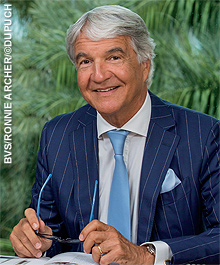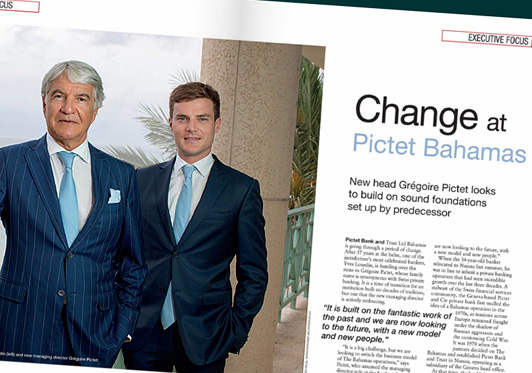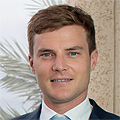| Published: Date: Updated: Author: |
The Bahamas Investor Magazine July 27, 2016 July 27, 2016 Steve Cotterill |
Pictet Bank and Trust Ltd Bahamas is going through a period of change. After 37 years at the helm, one of the jurisdiction’s most celebrated bankers, Yves Lourdin, is handing over the reins to Grégoire Pictet, whose family name is synonymous with Swiss private banking. It is a time of transition for an institution built on decades of tradition, but one that the new managing director is actively embracing.
“It is a big challenge, but we are looking to switch the business model of The Bahamas operations,” says Pictet, who assumed the managing director role at the bank at the beginning of the year. “It is built on the fantastic work of the past and we are now looking to the future, with a new model and new people.”
When the 34-year-old banker relocated to Nassau last summer, he was in line to inherit a private banking operation that had seen incredible growth over the last three decades. A stalwart of the Swiss financial services community, the Geneva-based Pictet and Cie private bank first mulled the idea of a Bahamas operation in the 1970s, as tensions across Europe remained fraught under the shadow of Russian aggression and the continuing Cold War. It was 1978 when the partners decided on The Bahamas and established Pictet Bank and Trust in Nassau, operating as a subsidiary of the Geneva head office.
At that time, the bank’s business on the island consisted of only a handful of local clients and the focus was clearly on wealth management. Lourdin arrived the same year and together with his colleagues started to buildthebankintowhat it is today. By the time he stepped down as head of the bank, The Bahamas branch had an exclusive high-end local and Latin American client base, with assets under management of $12 billion.
“He is probably the most famous banker on the island,” says Pictet of his predecessor. “He is incredibly passionate about what he does. He loves his job. He loves the bank. He is an excellent example for young bankers of what dedication and commitment truly are.”
Smooth transition
Lourdin, who will remain as chairman but no longer has operational or managerial responsibilities, has worked closely with his successor to ensure a smooth transition, helping Pictet to get to know the lie of the land in Nassau. “I have a lot to learn and he has a lot to teach,” says Pictet. “We have a great level of communication and he has introduced me to our local clients. It is not so easy for him to completely step back; after all, The Bahamas office is kind of like his baby.”
Once in the driving seat, the new director has wasted no time in looking to build on the existing foundations, with the thrust for growth being two- pronged: developing and maintaining local clients; and targeting new clients in the emerging markets of Latin America, specifically Mexico, Brazil and Argentina.
“The Latin American market is one of the fastest growing in the world,” he says. “You have a lot of newly wealthy and they need direction and advice with what to do with that wealth. We can provide a wide range of services for this very dynamic region of the world.”
But with big US banks already clamouring for market share, it is also a very competitive region. Many wealthy Latin American families have strong ties with the US through family, property or investments, so banking with US firms such as J P Morgan or Morgan Stanley, is commonplace. To compete like for like would present a huge challenge for a company such as Pictet, and besides, that is not its style. “We don’t want to take a team of ten bankers to Latin America like some of the bigger US banks do and target potential clients often with excessive insistence,” says Pictet. “We go with one banker and perhaps one investment advisor. We meet with maybe one family member and start to develop a close relationship. Our approach is a more gradual one.”
The LatAm market, however, is geographically wide and culturally extremely diverse. To cover the ground, the Swiss bank builds partnerships with a range of local intermediaries from lawyers to independent asset managers, shoring up a network of expertise rather than opening a boutique office. And they visit … a lot. “We are there all the time,” continues Pictet, who is fluent in Spanish having studied for three years in Barcelona. “It is important to meet with all the family members. Understand their culture. Find out what they want to achieve with their wealth and connect them with the right people to service their needs.”
Bahamas base
Maintaining these close relationships with Latin American clients is one of the reasons why The Bahamas is a perfect location for the private bank. Nassau provides a springboard into the region’s emerging markets and Pictet is building a team there to serve that growing client base and spearhead growth in the region.
“We go out to visit clients, but we also bring clients to The Bahamas,” he says. “It is important for them to see the bank and see the physical infrastructure we have in place. Banking is sometimes very abstract. Bringing them here makes it a more concrete, tangible experience.”
Proximity is one factor, but having a base in The Bahamas has other benefits. In Brazil the jurisdiction has strong brand recognition; in Mexico too. The wealthy of Latin America have a long tradition of private banking for such reasons as security and confidentiality, so a jurisdiction such as The Bahamas is familiar to them. “They see a Swiss institution with a strong reputation in an independent jurisdiction. This is very attractive to them,” says Pictet.
Global paradigm
For the new managing director, Nassau represents an important piece in the jigsaw of the bank’s global proposition. “We don’t only offer a booking centre in Nassau, we offer a range of services. It is part of the bank’s overall value proposition. We think much more as a group than we used to.”
This philosophy is underpinning the bank’s growth and comes at a time of enormous change in global wealth management and private banking. Since the banking crisis of 2007-2008, investors’ confidence in some asset classes has collapsed and the markets have been volatile. Average returns at Pictet remain stable at around six per cent, but below the 1990s heights of eight per cent.
Moreover, recent revelations about the tax habits of the world’s ultra wealthy have helped speed the march towards transparency and automatic exchange of information. This is the new normal for everyone, and smaller Swiss banks such as Pictet, perhaps paradoxically, are best positioned to keep a firm hand on the tiller and steady the ship.
“We still have a lot of money under management and although returns are not what we used to see, we believe we provide an excellent service,” says Lourdin, who has lived through the highs and lows of the last few decades. “We have to maintain that because it is easier now for clients to move their assets if they want to chase profit. That has made it more challenging in the field of wealth management, but our approach has always been long term. This means we are ready for the future.”
There is also an increasing complexity in the marketplace, as alternative investment products in areas such as fintech continue to gain traction and demand portfolio share. With many larger international banks looking to consolidate their offerings, in many cases abandoning their wealth management activities altogether, Pictet has continued to invest and grow.
“Some business models will not survive and you will have fewer actors, but better ones. Our bank has a big role to play in this new reality,” says Pictet. “We are global, but we are a small, privately-owned family business with very strong capitalization. We haven’t been associated with any of the crises.”
Nassau’s importance in this brave new world has been underscored by the bank’s investment in the offices, installing a new IT system that is fully integrated with the Geneva headquarters. “We have also invested in talent, bringing specialist bankers here and developing local staff,” adds Pictet.
People business
Ultimately, no matter what the changes in the financial services topography are, private banking is still a people business and it was this that brought Grégoire Pictet back into the fold of the family business. “I always wanted to work with people or with people’s businesses. I toyed with the idea of being a diplomat,” he says. “For me, banking has always been about making that human connection. To be a good banker you have to be a good listener. You have to be able to understand the different generations and manage their expectations–this is the main thing you have to have in our business.”
For Pictet, banking was in his blood. His grandfather and father were both bankers, as was his uncle. His cousin Marc was appointed partner of the group in 2010. “It was natural for me to be attracted to Pictet. I could see the strengths and advantages of working in a family business,” he says. “I liked the prospect of long-term strategy, with no shareholder pressure. I liked the environment of private banking; the one-to-one conversations.”
His move to The Bahamas from Geneva has so far been a pleasant one. “It is a beautiful country and I have found a very strong institution in Pictet Bahamas,” he says. “It is a strong brand and we have the talent–some of the best on the island in their specific fields. And they are very experienced; some have been with us for 40 years. Yves Lourdin created strong relationships with a great number of people on the island and this is something we want to keep and develop. There are a lot of opportunities in The Bahamas and in the region. The partners are very optimistic about Pictet’s Bahamas operations.”
A banking legacy
 After nearly 40 years at the helm of Pictet Bahamas, Yves Lourdin (pictured) prepares to hand over the reins
After nearly 40 years at the helm of Pictet Bahamas, Yves Lourdin (pictured) prepares to hand over the reins
When Yves Lourdin landed in Nassau as a young broker in 1978, pictet’s Bahamas operation had a staff of three and a handful of local clients. In the subsequent 37 years, the former Ceo has helped build the office to a staff complement of 90, with $12 billion in assets under management. In an exclusive interview with The Bahamas Investor the veteran banker offers insight into his distinguished career and the key elements behind the office’s success.
Q: Why did Pictet choose to set up operations in The Bahamas?
We came for very specific reasons: we were looking for a place that would allow us to better serve our Latin american clientele, logistically well located, and within a time zone that worked in our favour. In the 1970s and 80s the west was still in the Cold war with what was the soviet union, so we were looking for a site outside europe. we thought about Barbados but it was regarded as slightly outlying. We eventually decided on nassau and, looking back, it was a very wise decision. we have managed to build up a great business here.
Q: Why has it been so successful?
It worked out well for two main reasons: first, the successive governments of The Bahamas have always been supportive of our business interests and those of the branch and the legislation enacted ever since has certainly helped us a lot to facilitate our activities. nassau also had all the necessary infrastructure to make a business successful. we have been able to interact with the government and its administration at all levels, including making contributions to decisions on legislation. Financial services are a significant contributor to the gdp of The Bahamas and the successive governments have been aware of that, showing support and a positive attitude towards the financial and banking sector.
At one stage, Nassau increased its importance as a financial centre, with many banks from Europe coming here. Being well-located, English-speaking, with stable political institutions and a reliable legal system have been major assets for the development of The Bahamas as a financial centre.
On top of this you have all the other ingredients to carry out business in a proper and successful manner– a very good telecommunications infrastructure, the proximity to the us, a younger generation of well-educated individuals wishing to succeed and a well-trained workforce.
Q: The Bahamas has changed dramatically over recent decades. What was it like when you first arrived here?
In the late 70s, Nassau was similar to a large village and everyone knew each other; you were well connected with Europe with a number of direct flights. of course, when you arrive to a new place you have certain expectations and, after a while, you have to do some adjustments. Back then, when it came to things such as food, you couldn’t find all the things that you could in Europe. nowadays, it has changed tremendously.
There was a different approach to living and working in The Bahamas in those days. The international community was probably closer than it is today. we did a lot more things together; meeting during the weekends and playing sports. Today the international community has become much more integrated. Also, everybody seems to be more involved in their own worlds and we do not meet as often, but that is more a reflection of modern life than of a change specific to The Bahamas.
Q: You have spent most of your adult life living in The Bahamas. What has kept you here?
It is important to know that living in The Bahamas is fairly different from life in a European city. when we first came, it was just me and my wife, but as soon as we had children we realized even more the extraordinary quality of life offered by The Bahamas. Our young children enjoyed the sunshine for almost 365 days in the year so that they were able to play outside on most days. The Bahamas have provided us with an excellent environment for our family life, something which I probably would not have had if I had stayed in Europe.
In the late 70s, the schooling system level was insufficient. we realized that to encourage people to come to The Bahamas, it was important to offer a sufficient number of high-quality schools. so I soon became closely involved with the creation of the Lyford Cay school and its development.
Q: The bank has gone from strength to strength under your management. What were the key drivers behind that growth?
When we arrived in Nassau, there were relatively few assets under management, mainly for three or four clients who were then living in The Bahamas. We did not come here with the purpose of transferring assets out of geneva. We were focused on wealth management and had, with the banking license, the ability to manage all of our clients’ affairs out of The Bahamas without them having to deal with a bank in Europe.
Over the years, our clientele kept on growing, both locally and in Latin America. We started with three employees, reaching 30 after a few years and now have 90 people in Nassau.
An undeniable advantage of Nassau has been the accessibility of permanent residency to persons wishing to relocate to The Bahamas. As of the early 80s, we saw an increasing number of Europeans moving to The Bahamas. For those of them owning assets in the US and Europe, Nassau has proven to be an excellent solution to manage their affairs.
I think also that the decision to act as a big family office, and not just a bank mainly limited to investment management, also has contributed to our success. We have always offered a comprehensive service, from arranging permits to helping clients with dealing with real estate, education and health issues on their behalf. It was important for us to go above and beyond the call of duty to ensure that we facilitated not only our clients’ relocation but also their lives. We still do.
Q: What advice would you give to young bankers arriving on the island today?
You have to be dedicated, have a passion for what you are doing and show commitment. when you first arrive in Nassau, you have to be very careful to keep your head squarely on your shoulders. You have to come here to work and serve our clients in the best possible way, which has always been our ultimate goal, and not spend the time on the golf course or tennis court.
Q: How did you build a client base in the region?
Travelling was a main part of our work, particularly to Mexico, Peru and some other South American countries and I think that has been a key element to our success. Latin America is not an easy market to access as large American banks have a natural advantage there as compared to their European competitors. Nassau is in an ideal position as it is close to those countries. J P Morgan, Morgan Stanley, Goldman Sachs were well organized in the region, but one of our main advantages was that our asset allocation was much more diversified.
Q: After 37 years with the bank, what would you say is your legacy?
I am leaving behind an excellent team. One of the key elements of our success here has been the low turnover of staff throughout the organization. The key people have remained with us over the years and this is a key strength in a relationship business such as ours.










